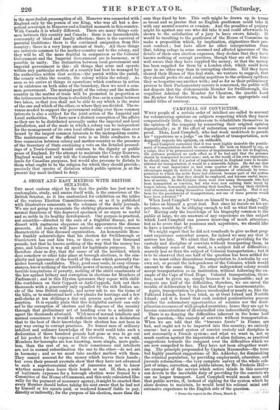CAMPBELL ON CONVICTLSM.
WHEN people of a certain order of intellect are called to account for volunteering opinions on subjects respecting which they know comparatively little, they endeavour to rehabilitate themselves in the opinion of the company by reasserting their original opinion dogmatically ; as if the effect of reiteration conveyed some moral proof. Thus, Lord Campbell, who last week undertook to parade his "experience as a judge" on the subject of transportation, now doggedly repeats his opinion, ex cathedra.
"Lord Campbell contended that it was most highly desirable the punish- ment of transportation should be continued. He took on himself to say, as a judge, that if he pronounced sentence of imprisonment for life in England, the sentence produced no such effect as if he had said that the prisoner should be transported beyond seas; • and, as the result of his own experience, he should state, that if a period of imprisonment in England were to be sub- stituted for transportation, it would be a miserable failure. He did say that it was of vast importance to find some quarter of the .globe where the advantages might be derived from the punishment of criminals by trans- portation to which the noble Duke had referred, because part of the system was reformation, so that they should be employed, and become useful mem- bers of society. In the Colonies there were now many thousands who had been transported as convicts, but who were now earning their bread by honest labour' i honourably maintaining the families, having their children well educated, and being themselves useful members of society. Had it not been for the punishment of transportation, not one of those persons would have been reformed."*
When Lord Campbell "takes on himself to say as a judge," &c., he takes on himself a great deal. But since he insists on his ex- perience, would he be obliging enough to tell us what that really is ? Having only the knowledge of his biography common to the public at large, we are unaware of any experience on this subject which Lord Campbell can possess deserving of much attention;
but as he avers that he possesses such e I
xperience we should like to have a knowledge of it.
We might regret that he did not vouchsafe to give us that preg- nant experience somewhat sooner, for indeed we may say that it arrives too late. We admit that the subject of providing for the custody and discipline of convicts without transporting them, in the ordinary sense of that word, is a subject full of difficulties ; scarcely less so than the subject of Colonial transportation ; but it is to be observed that one half of the question has been settled for us : we must either discontinue transportation to Australia by our own act, or permit the independence of the Colonies, which would amount to the same thing. No other independent colony would accept transportation as an institution, without following the ex- ample of the Cape of Good Hope. Colonial transportation, there- fore, must be given up, simply because it is impossible ; and as respects one half of the difficulties, therefore, we are saved the trouble of deliberation by the fact that they are insurmountable.
Again, transportation to places uncolonized or nearly so, like the Falkland Islands, has been tried, as at Goat Island and Norfolk Island; and it is found that such isolated penitentiaries possess neither the reformatory opportunities of colonies nor the disci- plinarian resources of well-peopled countries ; hence they are apt to become concentrations of ill-controlled vice indescribably shocking.
There is no denying the difficulties inherent in the home half of the question,—the custody of convicts without transportation. 'When we are told that the " travaux forces" in France are bad, and ought not to be imported into this country, we entirely concur : but a sound system of convict custody and discipline is not necessarily a French system; and what we want is, not so much caution against the importation of alien failures, as practical suggestions towards the conquest over the difficulties which we are now compelled to face. They have not been altogether want- ing. The principle propounded by Captain Maconoohie—the terse but highly practical suggestions of Mr. Adderley, for diminishing the criminal population, by providing employment, education, and juvenile reformation—the very complete survey of the whole sub- ject of crime, correction, and public labour, by Mr. Frederic Hill— are examples of the service which active minds in this country can devote to the inevitable duly of providing for the convicts we can no longer transport. Lord Campbell would much more aid that public service, g instead of sighing for the system which he alone desires to maintain he would bend his colossal mind and extensive experience to the English side of the question. .L • From the report in the 21tnes, March 2.
























 Previous page
Previous page